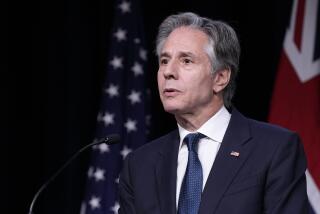Administration Takes Wait-and-See Attitude on Contra Aid Issue
- Share via
WASHINGTON — The White House said Friday that it is “very gratified” by the Senate’s symbolic vote favoring military aid for the Nicaraguan Contras and that it will “be watching very carefully” to see whether Nicaragua’s Sandinista government adheres to the terms of the Central American peace accord.
At the same time, White House spokesman Marlin Fitzwater said that the House’s earlier vote effectively blocking new U.S. military aid for the rebels means that “the major burden shifts to the other democratic countries to keep pressure on the Sandinistas to negotiate honestly and expeditiously.”
Fitzwater declined to speculate on how long the guerrillas, who will continue receiving previously approved aid through the end of this month, would be able to maintain combat operations.
In an interview with a group of reporters, Lt. Gen. Frederick F. Woerner Jr., head of the Panama-based U.S. Southern Command, said that the Contras, who are believed to have stockpiled some arms, should be able to maintain military operations for “a few months.”
Woerner added that the Contras probably will “hunker down” and conserve supplies by avoiding direct engagements with Sandinista army forces for the immediate future. “I suspect that they’ll hang tough waiting to see what happens in the U.S. Congress” in the next few months, he said.
If Congress does not approve at least a non-lethal assistance package soon, Woerner added, some rebels might give up and accept a Sandinista amnesty offer and others might become refugees in neighboring countries. Fitzwater also said that a deteriorating Contra force might create a “refugee problem” for other nations.
The White House said it hopes that the Senate’s vote on the Administration’s proposed $36.25-million aid package--although it was meaningless as a practical matter because the House already had defeated the measure a day earlier--is evidence that the U.S. government will not abandon the rebels.
The 51-48 vote in the Senate to approve the aid package “shows the strength of support for aid for the (Nicaraguan) Resistance and the idea that pressure needs to be kept on the Sandinistas as they go through the peace process,” Fitzwater said.
Congressional Democrats who led the opposition to the Administration’s plan said they intend to introduce a non-military assistance proposal of their own in about three weeks.
Fitzwater made it clear that the Administration sees the question of Contra aid as a potential political issue, especially if President Daniel Ortega of Nicaragua reneges on his promises to undertake authentic democratic reforms in that country.
In his remarks on the question, Fitzwater mentioned by name California Rep. Tony Coelho (D-Merced), the House majority whip, and Sen. Christopher J. Dodd (D-Conn.), both outspoken opponents of military aid for the Contras.
“I just think it’s important that we not forget the advocates who have put so much confidence in Mr. Ortega and the Sandinistas and that we keep that in mind as we judge the peace process,” Fitzwater said.
The regional peace agreement signed last August by the presidents of Costa Rica, El Salvador, Guatemala, Honduras and Nicaragua, obliges the five Central American nations, among other things, to end assistance to rebel groups operating in the region and to undertake reforms that include full press freedom and internal democracy in countries where such civil rights do not now exist.
White House officials indicated that the Administration has yet to make a plan for reviving assistance to the Contras. In addition to the arms included in the defeated aid request, the rebels would have received food, clothing and medical supplies.
Fitzwater said that “we will be anxious to see what the Democrats propose in the way of a humanitarian aid package.”
Times staff writer John M. Broder contributed to this story.
More to Read
Get the L.A. Times Politics newsletter
Deeply reported insights into legislation, politics and policy from Sacramento, Washington and beyond. In your inbox twice per week.
You may occasionally receive promotional content from the Los Angeles Times.










